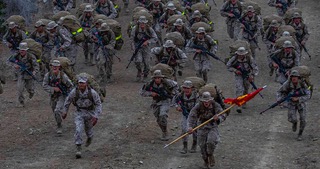Money Quote:
"As part of its redesign to faceoff against China the Marine Corps has eliminated its tank battalions, active duty law enforcement battalions and its bridging units.
"Marines with military occupational specialties that were eliminated had been offered easy transfer into the Army, where tank battalions are still going strong.
Berger said the Corps needs an older and more mature force to handle the increased complexities of a potential war against a near-peer opponent.”
assuming the writer and publisher of the latter piece wasn’t just being duplicitous and intending his piece as a political deception op to go with the false claim that Trump with his and his party’s massive military spending increases (with right-wing Democrats’s collusion) actually wanted to “end the endless wars,” unless with the “Peace of the Graveyard.”
Petraeus, McChrystal, Flynn, . . . Berger, are all "cut from the same cloth,” acting only under different circumstances.
https://www.marinecorpstimes.com/news/your-marine-corps/2021/11/24/why-the-marine-corps-wants-to-tank-national-guard-recruiting-efforts/?utm_source=Sailthru&utm_medium=email&utm_campaign=EBB%2011.29.2021&utm_term=Editorial%20-%20Military%20-%20Early%20Bird%20Brief
Why the Marine Corps wants to tank National Guard recruiting efforts
Philip AtheyWednesday, Nov 24
Historically the Marine Corps has had the lowest retention rate in the Department of Defense, as it intentionally has only kept 25 percent of first-term Marines.
As a result, the National Guard and other services have seen Marines fresh off a first enlistment as fertile recruiting ground, allowing the Guard to swell its ranks with already experienced troops.
The practice is so common the Army National Guard even has recruiters specifically trained and tasked to recruit prior service Marines.
But as the Corps looks to field an older more experienced force, it wants that to change.
“If we do our job right, they’ll never go to the Army or the National Guard to begin with,” Maj. Gen. Jason Bohm, the commander for Marine Corps Recruiting Command, told reporters on Monday.
On Nov. 3, Marine Corps Commandant Gen. David Berger released his talent management vision aimed at improving retention by treating Marines “like human beings instead of inventory.”
For those who left the Corps just to realize the grass is not always greener in the Army combat uniform, the Corps wants you back.
“Quite often, not to disparage any of the other services, but we do hear from (prior service Marines) saying ‘This isn’t quite what I expected, is there any chance I can come back?’” Bohm said.
There already are methods for prior service Marines to return to the Corps, but Bohm said it was not particularly easy.
The Corps will look to streamline that process and welcome the lost sheep back into the Marine Corps’ fold.
The Corps also will improve its efforts to inform Marines who are getting out on ways they can reenter the force if circumstances allow them to return or if they simply change their mind about getting out.
“We are certainly going to maintain contact with those people,” Bohm said.
At least for now the Army National Guard does not seem to expect much to change on its end.
“The Army National Guard Recruiting and Retention Force always seeks to recruit and retain the best available talent for the Guard,” Christina Mundy said on behalf of Army National Guard Recruiting and Retention in a Tuesday email.
Marine Corps Times has previously asked the National Guard for numbers on how many prior service Marines it enlists each year and has not heard back.
While the Marine Corps is looking to improve overall retention, the Corps is planning to downsize over the next few years and has completely eliminated certain military occupational specialties.
In 2021 the Corps had an authorized active-duty end strength of 181,200 Marines. By 2030 the Corps looks to shrink the active duty force to roughly 174,000 Marines, the smallest the Corps has been since 2002.
To slowly reduce numbers while improving retention the Marine Corps expects that it will reduce its recruitment goals.
As part of its redesign to faceoff against China the Marine Corps has eliminated its tank battalions, active duty law enforcement battalions and its bridging units.
Marines with military occupational specialties that were eliminated had been offered easy transfer into the Army, where tank battalions are still going strong.
Berger said the Corps needs an older and more mature force to handle the increased complexities of a potential war against a near-peer opponent.
On the future battlefield Marines will have more responsibilities pushed down to lower levels than ever before.
”The machine gunner who is also corpsman, a medic, also has to be able to talk to MQ-9 UAVs and bring in ordnance and understand the satellite connection that is required to do that,” Berger told reporters in early November.
The Corps is also leaning on updated science that shows people do not fully mature until they are in their early to mid-twenties and that peak physical performance does not happen until someone is in their late 20s.
“We based our force on an assumption that (18 to 20-year-olds) were indestructible supermen,” Berger said. “Turns out it’s not. We don’t peak physically or cognitively until our late 20s.”
“We can’t have a force full of 18 to 21-year-olds,” Berger said.
Share:
